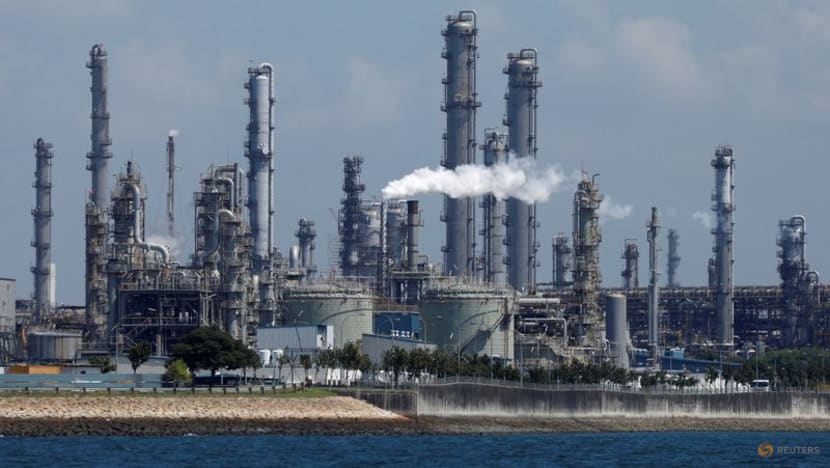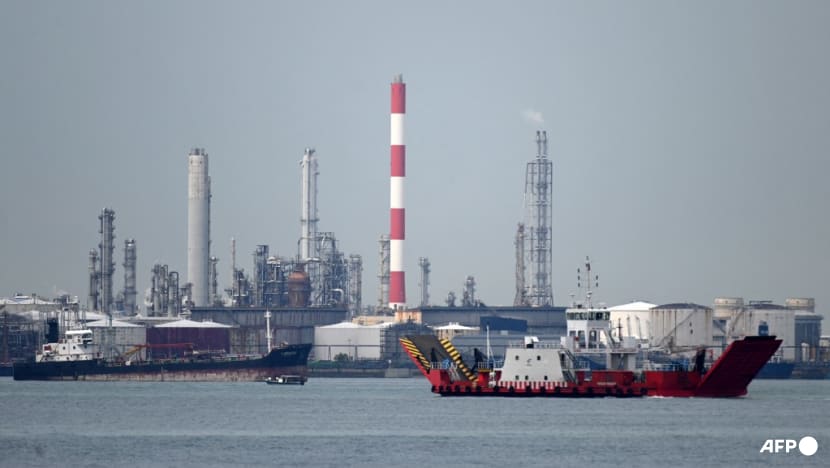Commentary: COP28 raises questions about the future of Singapore’s fossil fuel-reliant industries
For the first time, the UN climate summit is calling for the world to move away from fossil fuels. Singapore’s industrial sector needs to address its sizeable share in the country’s total emissions, says NUS Energy Studies Institute's Roger Fouquet.

File photo. A general view of Shell's Pulau Bukom petrochemical complex in Singapore on Jul 15, 2019. (Photo: Reuters/Edgar Su)

This audio is generated by an AI tool.
SINGAPORE: The United Nations’ COP28 climate summit in Dubai concluded on Wednesday (Dec 13) with an agreement for the world to “transition away from fossil fuels”.
For the first time, delegates agreed that all countries need to move away from fossil fuels to avert the worst impacts of climate change. Despite the inevitable loopholes, this sends a clear signal that the energy sources that fuelled the global economy for the past two centuries should be phased out.
The COP28 deal provides an imperative for all countries to consider how they will wean themselves off fossil fuels, on top of meeting their targets for cutting carbon emissions.
Singapore plans to peak carbon emissions between 2025 and 2028, and to achieve net zero emissions by 2050. At present, however, the Singapore electricity supply system is heavily reliant on natural gas for its power generation, which is responsible for two-fifths of the economy’s emissions.
Given Singapore’s lack of natural resources for producing renewable energy, the most likely path for transitioning away from fossil fuels would be to increase its imports of low-carbon electricity.
Though power-related emissions may fall as Singapore ramps up plans to decarbonise the energy sector, the industrial sector needs to address the 44 per cent of the country’s emissions for which they are directly responsible.

INDUSTRY MUST CONFRONT A FOSSIL FUEL-FREE FUTURE
In particular, the oil refining and petrochemical industry is directly responsible for a sizable share of those emissions. This responsibility has been placed in a new light following the COP28 agreement, and raises the question about the future of this industry in Singapore.
Shell’s announcement in June of an ongoing strategic review of its assets on Pulau Bukom and its petrochemical facility on Jurong Island offers a clue. It might suggest that Singapore no longer offers a comparative advantage in this business, amid rising operation costs, volatile commodity prices and growing pressures to transition into a low-carbon world.
As a sign of the times, Singapore is developing low-carbon hydrogen as an energy alternative, which the Ministry of Trade and Industry said could supply up to half of Singapore’s energy needs by 2050. Establishing the infrastructure to import, store and transform hydrogen into power could put Singapore in pole position to deliver on the need for green growth in the region.
Irrespective of the direction Singapore takes, transforming the industry to be environmentally sustainable will involve radically reducing its emissions.
In 2024, Singapore’s carbon tax will be raised from S$5 per tonne of carbon dioxide to S$25 per tonne. Companies that emit more than 25,000 tonnes of greenhouse gases are subject to the tax, which include 30 to 40 firms such as oil refineries and power plants. The companies paying carbon tax contribute 80 per cent of Singapore’s emissions, so a higher tax should give them pause.
Given that Singapore’s carbon tax is still low by international standards, the recent COP28 agreement raises the question whether the carbon tax rate should be more ambitious and its scope expanded.
DATA CENTRES, MARITIME AND AVIATION
Another area to keep an eye on is the information and communications technology (ICT) sector. Currently, the ICT industry is responsible for a relatively modest 8 per cent of electricity consumption in Singapore. However, ICT power use has quadrupled over the last 10 years.
According to consultancy Cushman and Wakefield, Singapore is now the largest data-centre market on a city basis in the Asia-Pacific outside China, with more than 40 data centres. Given the growth potential of this industry, it is important for data centres to adopt the latest smart cooling technologies.
A further concern is maritime transport and aviation, business activities which Singapore is a hub for. The emissions associated with these sectors are generally not included in national estimates, because the fuels used are categorised as “international bunkers” and are not included in the Paris Agreement. This loophole has limited the pressure to address these sectors’ emissions until recently.
If the aviation industry fails to abate its emissions, it could consume more than a quarter of the world’s carbon budget for 1.5 degrees Celsius of warming by 2050. Although the aviation industry has recently agreed to reach net zero emissions by 2050, this is a voluntary agreement which risks being reneged upon if procuring enough sustainable aviation fuel or commercialising electric planes proves too challenging.
A rigorous carbon accounting model would include all emissions attributable to Singaporeans’ air travel. It would also include the emissions due to shipping of goods they buy. Ideally, it would additionally account for the emissions due to the production of goods imported into the country.
While these indirect emissions are more challenging to estimate, they are crucial in getting the full picture of Singapore’s carbon footprint. It is time for individuals, companies and countries to take responsibility for their own actions and the environmental impacts they cause.
The transition away from fossil fuels is now official. The urgency of the climate crisis behoves all countries to take stock of and apportion responsibility for their emissions. The conclusion of COP28 is a chance for Singapore to review its climate strategy and decide where it should strengthen its efforts.
Roger Fouquet is Senior Research Fellow at Energy Studies Institute, National University of Singapore.

















